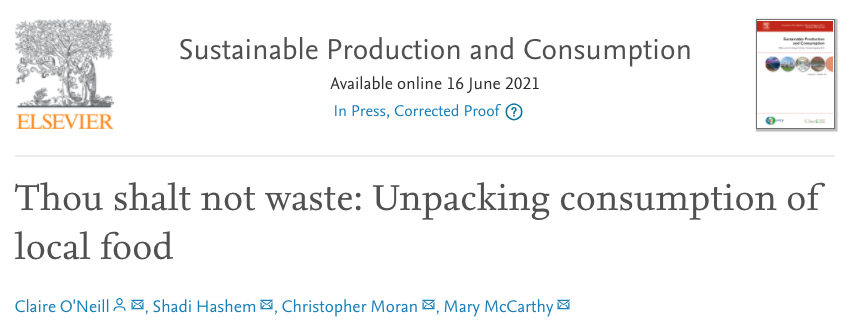Abstract
Consumption of local and seasonal produce has been identified as an important element of sustainable food consumption. Alternative food networks (AFNs) play an important role in local food distribution and the socio-technical innovations in this space provide for rich exploration. The aim of this paper is to investigate how households’ food practices are emerging within the new material infrastructures of two AFNs – one community supported agriculture (CSA) and one food assembly (FA), based in Ireland. A social practice theory (SPT) approach was adopted to explore the nature of meanings, competencies, and the role of these new infrastructures in relation to the consumption of local and seasonal food. A mixed-method approach of ethnographic-style in-depth interviews, non-participant observation and photo food diaries were used to explore the everyday food practices and routines of 10 CSA members (rural-based) and 10 FA customers (urban-based). The findings offer insights into the role these two AFNs play in sustainable food consumption via the meanings ascribed to ‘local’ food, how such foods were incorporated into routine consumption practices, and the ways in which surplus and unfamiliar foods were diverted from waste streams. The findings suggest a strong aversion to wasting local food. Food surplus or unfamiliar foods acquired via the AFNs, rather than succumbing to the waste stream becomes part of a flexible and resourceful approach to circularity. Households engaged in creative cooking and preservation practices and conduits for disposal such as the fridge and freezer played an important role in housing surplus as it awaited recovery. The higher value placed on food acquired from both AFNs safeguarded it from the waste stream and instead was creatively transformed, preserved, and otherwise recovered and revalued to re-enter the cooking space as raw material for use. This paper presents evidence of how the alternative positioning of AFNs can enable alternative consumption routines, where a reorganisation of practices occurs within the household to account for surplus or unfamiliar local produce.
Find the full article here.

